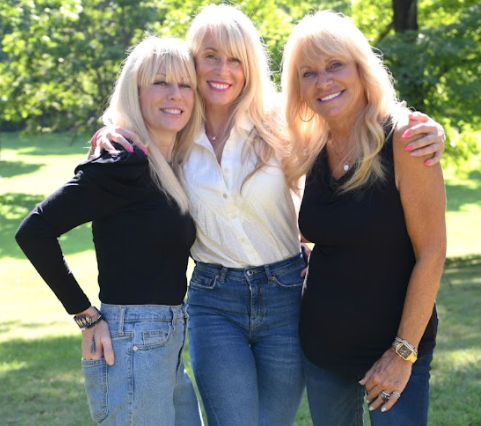Melissa Hodgson, her mom, and sister share a lot in common—great smiles, blond hair, and little did they know, a BRCA gene mutation. A BRCA mutation increases the risk of developing breast, ovarian, prostate, and pancreatic cancers in both women and men. The family had absolutely no idea they were at risk until Melissa was diagnosed with breast cancer.
Now, the whole family has undergone what’s called “Cascade Testing” and is taking preventative measures to protect themselves.
We asked Melissa about her experience with breast cancer and being a carrier of a BRCA mutation.

Had you ever heard of BRCA or genetic testing prior to your referral for testing?
It’s crazy to say but yes, because of Angelina Jolie. If it wasn’t for her speaking out, I would have not known about the gene. I found out that I also have factor V Leiden, which is a blood clotting gene, I never heard of it or knew that I had it but it was found during my testing.
What did you think when you were referred for genetic testing?
Despite having no family history, I thought it was another step in finding answers, the more you know the stronger you are. The more you can figure out what you need to do to take care of yourself. It got me wondering why are we not doing this at 30 or earlier? Why doesn’t insurance pay for this? I had so many questions for the genetic counselor and unfortunately, she could not answer them.
Did you think you matched who the public thinks is right for genetic testing such as a family history, young age, etc.?
No, the public has no idea. Nor did I before I was diagnosed. This is a big problem because if they don’t know, that means women out there are NOT testing – and that scares me. This story NEEDS to be told! How many women are not doing genetic testing that should – testing that could save their life? It’s 2021 why are we so behind?
How did you react to the news of being BRCA+?
I was scared at first, is this a death sentence? What about my daughter – what does that mean for her? Which then changed my thoughts to I NEED to be strong for her. I need to tackle this head-on and face all the fears I had. It was not easy, but I had such great people and doctors around me.
When I got the news I was scared and anxious, but I also jumped right in. I SPOKE up, talked about my feelings, concerns, questioned the doctors, and gave my opinions. I had to advocate for myself – I think a lot of people are afraid to question their doctors. This is your body, you need to be the one making those final decisions for yourself.
Do you have any tips for people who have tested positive for a genetic mutation on next steps?
Do your homework, ask questions, read information (knowledge is power!), talk to people who have been there, reach out to help others. I feel like I have so much to give to others and I want to be there for them.
What advice do you have or did the genetic counselor give you for having conversations with family?
My family is very open and honest with each other. The counselor said to be transparent. She shared that family members are scared to tell other family members because of what they might say or they will feel judged. How horrible is that? I can’t imagine not being able to tell my family members the truth because I was scared. I would tell all women to not be afraid of their diagnosis and share, you never know what you might find in the process. I know I found my strength.
We also asked Melissa’s physician, Dr. Ami P Vaidya, Co-chief, Division of Gynecologica Oncology and Vice-Chair, Department of Obstetrics and Gynecology, Hackensack Meridian Health a bit more about genetic testing.
Melissa’s family had “cascade testing.” Can you explain what this means?
Cascade testing refers to the genetic testing that can be offered to family members at risk of a mutation based on positive test results of another relative. It is often testing these relatives with THE SELECT genetic mutation identified in their family member – not all possible mutations.
Which patients with cancer should be referred for genetic testing/counseling?
There are a number of recommendations put forth by various cancer organizations to guide testing. The NCCN is best known for its guidelines for testing. As more and more data is collected on the incidence of pathogenetic variants/ mutations in various populations, modifications to recommendations for testing are being made. For example, we are now offering genetic testing to all women with a personal history of ovarian and fallopian tube cancers.
If a person has multiple family members who have died with a breast cancer diagnosis, but they have not had cancer themselves, can they be tested?
Yes, they can. It is best for them to discuss testing options with their doctor and a genetic counselor.
Learn more about genetic counseling and testing for familial breast cancer here on OncoLink.
Source







